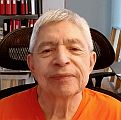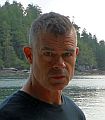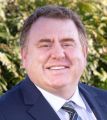BRING SCIENCE INSIDE LOCAL GOVERNMENT: “The job of a scientist is to provide the best advice to help people make a good decision,” stated Dr. Dave Preikshot, Senior Environmental Specialist with the Municipality of North Cowichan

“Scientists walk that tightrope between being overly reactive or not bringing the appropriate dynamics to bear on a situation. That is the debate in so many policy decisions which ultimately are up to senior managers, politicians and the public to make. Hopefully, scientists can provide information that helps. I believe that scientists need to talk to politicians, managers, and community members. However, it is really hard to keep everybody interested over the long term that characterizes ecosystem management questions. That is a challenge I face,” stated Dr. Dave Preikshot.
BLUE ECOLOGY IS A PATHWAY TO WATER RECONCILIATION: “Rather than wondering how much more can we take or impact land before we need to stop, instead we should ask how much longer should we let the water and land heal, before we ask for more,” stated Michael Blackstock (September 2023)

The Blue Ecology video documentary seeds the idea that hope lies within the spheres of influence for local governments, whether Indigenous OR non-Indigenous. At its heart, Blue Ecology is about taking responsibility for care of the land and passing on the intergenerational baton. The video also seeds the idea that making it so requires a change in attitude to achieve the five Blue Ecology principles – Spirit, Balance, Harmony, Respect, Unity. The primary audience is local government. The Watershed Moments goal is to help remove their fear of saying or doing the wrong thing.
BLUE ECOLOGY IS A PATHWAY TO WATER RECONCILIATION: “Blue Ecology shows us a path to interweave Indigenous and Western science to better steward our watersheds,” stated Paul Chapman, co-producer of the Watershed Moments 2023 documentary video released on World Rivers Day 2023

“The earliest inhabitants on the land, BC’s First Nations, settled near rivers. More recent settlements have followed suit, settling near rivers for fresh water supply, travel, commerce, food supply, recreation, and in our built environments storm water and wastewater services. Climate change has compounded the stresses our modern practices and settlements impose on watershed health and healthy functioning. The new normal includes drought, flood and fire on a seasonal basis. A hopeful way forward is found in Blue Ecology,” stated Paul Chapman.
BLUE ECOLOGY IS A PATHWAY TO WATER RECONCILIATION: “Water brings people together. It is a natural starting point for any conversation about common interests, and by extension, our shared future,” stated Kim Stephens, co-producer of the Watershed Moments 2023 documentary video released on World Rivers Day 2023

“In 2017, we commenced the process of mainstreaming awareness of Michael Blackstock’s work and ecological philosophy into the local government setting. Watershed Moments 2023 is the latest evolution. The Partnership is on a journey with Michael Blackstock. It is taking us time to build trust and relationships with First Nations to the point of being able to showcase Blue Ecology in action. Watershed Moments 2023 showcases a free-flowing conversation, with Richard Boase steering the process. This allows the chemistry with Brian Carruthers and Michael Blackstock to take its natural course,” stated Kim Stephens.
BLUE ECOLOGY IS A PATHWAY TO WATER RECONCILIATION: “Our Gitxsan legal system, laws and traditions dictate that we must leave a functioning house group and a functioning landscape for future generations of people from the house,” stated Gitxsan hereditary chief Hanamuxw in the Watershed Moments 2023 documentary video

“Our job as chiefs is to take care of the members of the wilp and the land base that we have. The concept of that responsibility is found in the word gwelx ye’enst which means leaving things for the future generations. That is the ethic that we need to uphold. We have based that experience on what we have been doing since the last glaciation period. That is some 15,000 years of experience. We take our Gitxsan science and we meld it and weave it in with Western science and look at how those two systems can co-exist,” stated Chief Hanamuxw.
BLUE ECOLOGY IS A PATHWAY TO WATER RECONCILIATION: “We need to measure progress in different ways. We are not going to measure Water Reconciliation in a year-end report because it is about a mindset change,” stated Richard Boase, moderator of of the Watershed Moments 2023 documentary video released on World Rivers Day 2023

“For 30 years, I have used only Western science in my efforts to make changes in water resources. For the most part, I have not been successful. I asked a First Nations elder what can I do differently? By viewing everything around us in the natural world as having spirit, and having a personality and a purpose in how it relates to the people who live on the land, you are starting on the right path, the elder explained. This was a profound moment for me. It dawned on me that if we redirect water into a wetland, for example, life is going to happen. Water will create life with little or no help from us,” stated Richard Boase.
BLUE ECOLOGY IS A PATHWAY TO WATER RECONCILIATION: “It is not about technical data. It is not about numbers. It is about connection, it is about perspective, it is about that spiritual understanding and how things are connected. Indigenous knowledge is a sense, a feeling, an appreciation for that connection,” stated Brian Carruthers in the Watershed Moments 2023 documentary video

“When I think about the experience in the Cowichan, in many ways the region is still in the theoretical stage in terms of weaving Indigenous knowledge and Western science. We created the framework for that to happen. The foundation for interweaving in the Cowichan region is really with the Cowichan Tribes. Everything the Cowichan Valley Regional District (CVRD) has done has been shoulder to shoulder with them. The framework is in place and the Drinking Water and Watershed Protection service exists. However, a reality is that things do take time,” stated Brian Carruthers.
PARTNERSHIP FOR WATER SUSTAINABILITY PASSES ECOLOGICAL ACOUNTING BATON TO VANCOUVER ISLAND UNIVERSITY: “I just wish that partnerships like this existed among all research projects. Unfortunately, they do not,” stated Graham Sakaki, Regional Research Institute Manager

“There are lots of partnerships that exist for selfish reasons. But the EAP Partnership is selfless, and from all angles. It is a leap of faith for member local governments. Partnership for Water Sustainability commitment to passing the baton is unwavering. The EAP Partnership was set up in a really unique, really valuable and viable way right from the beginning. The Partnership for Water Sustainability made the connections to the three local governments. Vancouver Island University, as a smaller university, is very focused on applied research and community engagement. This is a good fit for the EAP mission,” stated Graham Sakaki.
MOVING TOWARDS WATER BALANCE: “Budgets can be aligned with best practices, ecological know-how and boots in the stream to steward the critical infrastructure that is our watersheds,” stated Paul Chapman, Executive Director, Nanaimo & Area Land Trust

“Our discussions lead to an expanded common vocabulary. Sustainable Service Delivery, Eco-Assets and Eco-Asset Management, the Ecological Accounting Process, Municipal Natural Asset Inventory, Riparian Deficit, and watershed stewardship are some of the words in our new common tongue. The rabid environmentalist, the cold-hearted accountant and the aloof engineer could come together and focus on a common goal – Water Balance. At a very key level, it is about our relationship with water and with each other. We design and build our communities based on our relationship to water,” stated Paul Chapman.
MOVING TOWARDS SUSTAINABLE SERVICE DELIVERY IN THE COMOX VALLEY: “Asset Management for Sustainable Service Delivery is much more than setting some money aside for infrastructure replacement. It must be a comprehensive and integrated approach that links the past, present and future,” stated Geoff Garbutt, City of Manager, City of Courtenay

“In my mind, the phrase Asset Management for Sustainable Service Delivery is a euphemism for make the right decisions, think about the future, and then take action. It has got to evolve because the future is NOT the past. We also need to adapt moving forward. So, that means Asset Management for Sustainable Service Delivery has got to reflect where the community is going as well. If you are only going to make decisions that maintain your assets as they are, that is insufficient. The process needs to evolve to meet the community’s changing needs,” stated Geoff Garbutt.

